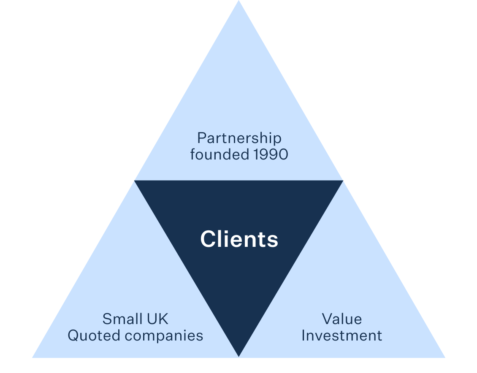Background to Aberforth
History and Purpose
Aberforth was established in 1990 and remains wholly owned by partners working at the firm. The firm’s purpose has not changed – to deliver superior, long-term investment returns for its clients and for the ultimate beneficiaries of its clients’ portfolios. Aberforth was designed by its founders to be a simple business in the belief that this would allow it to endure and improve the investment outcomes for its clients.
Three central aspects of the firm – partnership, the focus on small UK quoted companies and the value investment philosophy – support this purpose. These aspects are explained below and HERE. Further detail on Aberforth’s investment philosophy and process is available HERE.

Small UK Quoted Companies
Aberforth’s investment universe is the Deutsche Numis Smaller Companies Index (Excluding Investment Companies). It is also known as the DNSCI (XIC) and is maintained by the London Business School. The index represents the bottom ten percent of total market capitalisation of the main UK equity market.
Aberforth invests only in small UK quoted companies. Small companies have a better performance record than do large companies. The London Business School (LBS) calculates that at 31 December 2024 the DNSCI (XIC) has beaten the entire UK market by 2.7% per annum since 1955 in total return terms.
The stockmarket’s pricing of smaller companies is relatively inefficient. This creates the opportunity for investors, such as Aberforth, who analyse the companies in depth and actively manage the portfolio of investments. The inefficiency has grown over time as both institutional investors and the stockbroking community have reduced their time spent on smaller companies. At the same time, regulation has made institutional investors more cautious about liquidity, which has seen general interest in small companies wane. This has rendered the investment opportunity more attractive.
Value Investment
Aberforth has always followed a value investment philosophy. There is good evidence in the UK and in other stockmarkets that a value approach can contribute to superior investment returns. The London Business School (LBS) calculates that at 31 December 2024 value stocks in the DNSCI (XIC) have beaten growth stocks by 3.6% per annum since 1955 in total return terms.
The LBS defines value stocks simply as those with low price-to-book ratios. Aberforth uses a range of valuation metrics, which vary according to the type of company under consideration and the nature of the potential buyer of that company. Additionally, in determining target valuations for companies, Aberforth’s investment team considers a business’s fundamental characteristics. These include balance sheet strength, profitability, expected growth, competitive positioning and governance. Notwithstanding this broader determination of value, the average valuation ratios of Aberforth’s portfolios are usually lower and therefore more attractive than those of the investment universe.
Value investment is generally seen as being the opposite of growth investment. From this it is often inferred that value investors do not invest in growing businesses. More accurately, value investors want growth but they are typically unwilling to extrapolate high growth rates into the more distant future. This scepticism can create a margin of safety in investments, which helps limit downside when growth rates disappoint and trigger a sharp share price de-rating.
Partnership
Aberforth is a limited liability partnership, which is entirely owned by six working partners. This ownership structure brings several advantages.
Partnership engenders a collegiate ethos, which permeates the investment process and the firm as a whole. Emphasis on the team rather than on individuals supports the partners’ ambition to perpetuate the partnership as it makes the transition to future generations. In turn, this improves the likelihood that Aberforth’s differentiating characteristics, which have served clients well to date, can be preserved.
The partners are free to concentrate on one asset class, to follow the value investment philosophy and to prioritise existing clients. The ability to stand back from the short term noise of the investment world and to take a longer term view has contributed to the good investment returns achieved by Aberforth’s clients over time. The common interests of Aberforth and its clients are reinforced by the partners each investing a significant portion of their personal savings in the collective funds managed by the firm.
Funds under Management
Aberforth manages two investment trusts, one unit trust and segregated mandates. Aberforth Smaller Companies Trust plc (investment trust) and Aberforth UK Small Companies Fund (unit trust) have virtually identical diversified portfolios, normally comprising of around 80 investments. Aberforth Geared Value & Income Trust plc (investment trust) has a similarly diversified portfolio and will normally consist of investments in between 50 and 100 individual companies, but with a higher average yield than the other funds’ portfolios. At 31 October 2025, funds under management totalled approximately £2.0 billion.